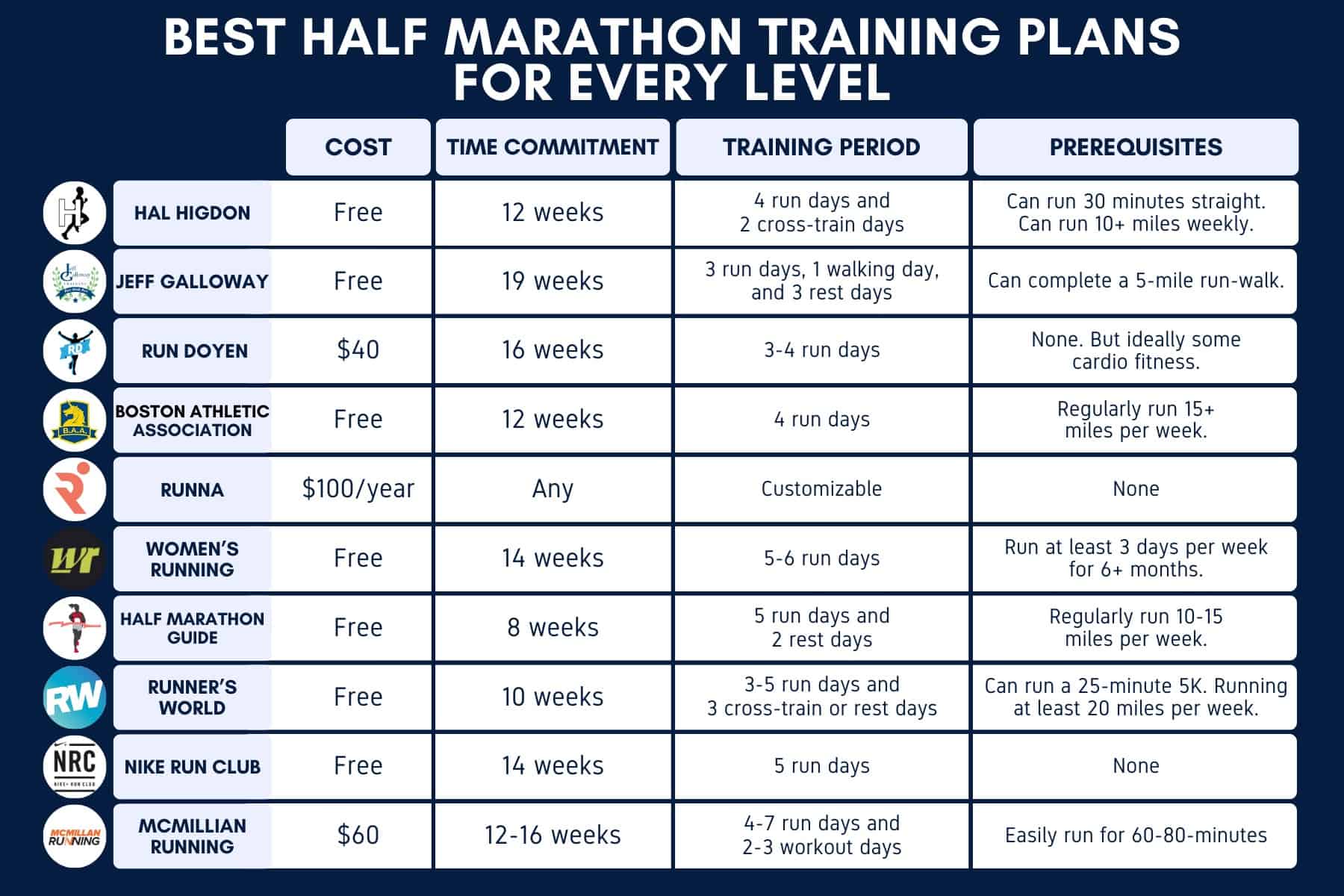Too many runners fall into the trap of choosing a half marathon training plan because it appeared on a Google search. Or, maybe it came up on an Instagram ad. Or even, it was used by their great Uncle Harry’s neighbor who PRed once in 1973. No offense to Uncle Harry’s neighbor, we love him, but I don’t know if he’s qualified to give you advice on the best half marathon training plan.
A good half marathon training plan is an individual journey. The right one for you must align with your fitness level, goals, and preferences.
I know how tricky it can be to find the right plan. I’ve used many of the training plans included below and have even designed plans for various platforms.
There are tons of good half marathon programs in the world, from tried-and-true classics to new dynamic apps. Here, we’ll talk about how to find what’s best for you. And, we detail some of the best ones out there for every level of runner.
How to Choose the Best Half Marathon Training Plan for You
There are a number of factors for you to consider when comparing one half marathon training plan to another:
The intensity of the plan
It’s all about matching your current fitness level and race goals. A new runner should be looking at a plan for beginners that offers a slow progression to build endurance, a focus on mileage volume, and ample time to get your body prepared. Seasoned runners looking to set a PR? Dive into an intermediate or advanced plan that pushes boundaries.
Your optimal training period
How long do you have to train for your half marathon? How long are you willing to train for? Half marathon plans can span from 4 to 20+ weeks. If you’re starting from the couch, opt for a 20-week plan to give yourself time to build up mileage slowly and safely. Experienced runners who are already logging 25+ mile weeks can get away with an 8- to 10-week plan. Many runners feel like 12 to 14 weeks is the sweet spot of preparation. There is no hard and fast rule on the ideal training period. But, consider your current fitness level, previous training, ultimate goal, and personal preference.
Your preferred training philosophy
Some plans focus on long, slow runs and high weekly mileage. Others will have you on run/walk combinations. Others include speedwork. Choose a training approach that makes you feel excited but that will also work with your body.
Your schedule
A successful plan syncs up with your life. Whether you’re all about those high-mileage weeks or crave a manageable three-day running schedule – you’re the boss. But, be sure to find a training plan that fits in your existing lifestyle.
How much money you are willing to spend
Some plans are free, others cost upwards of $100. The general rule is that the more tailored the plan is to you, the pricier it will be. While free is great, this plan is an investment in your running goals and yourself. Of course, if free is all you can afford, there are great options. But, many of the pay-for plans will be better.

The Best Half Marathon Training Plans
- Best for First-Time Half Marathoners: Hal Higdon Novice 1 Half Marathon Training Plan
- Best for Free: Jeff Galloway Run-Walk Half Marathon Training Plan
- Best for Total Beginners: Run Doyen Level 1 Training Plan
- Best for Intermediate Runners: Boston Athletic Association Half Marathon Training Plan Level One
- Best Training Plan App: Runna
- Best for Experienced, Middle-Aged Runners: Sara Hall’s Half Marathon Training Plan for Women’s Running
- Best 8-Week Training Plan: Half Marathons Guide 8-Week Plan
- Best for a Sub-2-Hour Half Marathon: Runner’s World Sub-2 Half Marathon Training Plan
- Best for Runners Who Want a Community: Nike Run Club Half Marathon Training Plan and App
- Best for Advanced Runners: McMillian Running Half Marathon Training Plan Level 5
Best for First-Time Half Marathoners: Hal Higdon Novice 1 Half Marathon Training Plan
| Cost | Free |
| Time Period | 12 Weeks |
| Time Commitment | 4 run days, 2 cross-train days |
| Prerequisites | Able to run at least 30 minutes straight without walking and log 10+ weekly miles |
Hal Higdon’s running training plans have been widely used for decades. If you took a poll of veteran runners, many would say they have used a Higdon training plan at least once. The most popular of which is his Novice 1 plan to complete our first half marathons.
Higdon is a renowned runner and author and has designed his training plans to emphasize gradual progression and balance.
The Novice 1 plan is exceptional for runners who are new to the 13.1-mile distance. The mileage builds up gradually. It features four running days and two rest or cross-training days per week. The longest long run in the program is 10 miles.
One of the best parts of Higdon’s plan is the inclusion of “tune-up races.” These are shorter races within the training cycle that will help newbies get accustomed to the racing environment and change of pace.
Since there aren’t speedwork days in the Novice 1 plan, these races are great to shake the rust off and move. Plus, they add some fun and motivation to an otherwise grueling training process.
I also love that Hal Higdon now has an app where you can access all his plans. Like the plan on the site, the app is free. For a fee, you can have it tailored to you.
The one thing runners should note: The Half Higdon Novice 1 plan works best if you’re already able to run at least 30 minutes without walking and be up to at least 10 weekly miles. If you’re not reaching these benchmarks quite yet, look at the base training plans below.
Best Free Training Plan: Jeff Galloway Run-Walk Half Marathon Training Plan
| Cost | Free |
| Time Period | 19 Weeks |
| Time Commitment | 3 run days 1 walking day and 3 rest days |
| Prerequisites | Can completed a 5-mile run using the run-walk |
If you’ve signed up for a half marathon but have never run a step in your life, we’ve got the coach for you.
For years, Jeff Galloway has preached the run-walk method. Tens of thousands of runners have followed his format to achieve huge goals.
The Jeff Galloway’s Run-Walk Half Marathon training plan is meant to get people running the distances they want without overtaxing the body or mind. This makes it great not only for first-timers but for those coming back from injury or who are injury-prone.
The training plan follows a gentle progression with three running-walking days, one walking day, and three rest days.
Galloway’s run-walk method is great for scaling from the couch. But, it can certainly be taken on my advanced runners who want to run fast during the speedier part of the programing.
Many half-marathon training plans will have you stop short of the actual 13.1 on training runs. Galloway’s plan has you do the longest long run at 14 miles.
Many coaches would caution runners not to do this before the race, the gentler run-walk method makes the longer mileage less impactful on your body. This is also a longer plan, at 19 weeks, so runners must be committed to a long process.
Finally, the notes for this plan say an athlete should have completed a five-mile-long run-walk within a month of starting this half marathon training program. If you’re feeling like your conditioning is lacking, Galloway has a buildup that will help get you ready for the plan.
Related: Everything You Need to Know About Run-Walk Half Marathon Training
Best for Total Beginners: Run Doyen Level 1 Training Plan
| Cost | $40 |
| Time Period | 16 Weeks |
| Time Commitment | 3-4 run days |
| Prerequisites | None. But ideally some cardio fitness. |
If you’re in decent shape but lack running experience, this Run Doyen 16-week training program will get you to a half marathon finish line without too much suffering. D
esigned for people with no prior running experience, the program begins with a blend of walking and jogging, progressively building your endurance towards successfully running the entire 13.1 miles on race day.
This plan is great for runners aiming for a goal race pace of 8:00 to 12:00 minutes per mile. The plan recommends a weekly mileage range of 15 to 25 miles. The mileage should be spread across three to four running days per week, with the longest training run reaching 10 miles.
For $40, you will gain access to the well-balanced plan crafted by Tara Welling. Tara is a USA Half Marathon National Champion with a time of 1:10:25. She is an expert coach who believes quality mileage is the foundation of your training plan.
One key feature that makes it worth paying for: The program uses the RunDoyen Hadley Pace Calculator. This is a proprietary and scientifically-backed method to calculate your training paces based on the goal time you input.
Also, your plan populates through Final Surge – an app that seamlessly integrates with your running watch to help you maintain the correct paces for every run.
For beginners, this extra layer of guidance and individualization is a great training weapon that will help you get to the start with confidence.
Best for Intermediate Runners: Boston Athletic Association Half Marathon Training Plan Level One
| Cost | Free |
| Time Period | 12 Weeks |
| Time Commitment | 4 run days |
| Prerequisites | Run 15+ miles per week regularly |
For runners who have completed a half marathon before and are ready to train hard for their next, the free, 12-week B.A.A. training plan offers a great plan to help you level up your time.
I love this level-one plan from the B.A.A. because it’s challenging while still being accessible to most runners. It’s split into three phases: A prep phase for two weeks, a main training phase for eight weeks, and a two-week taper. Each week, there are four running days. During your main training phase, there are speedwork days and race pace miles, which are varied and look really fun. The longest long run is 10 miles, which is the perfect amount of prep for a half.
It’s best suited for runners who are already running at least 15 miles per week. Those who have completed long runs of at least five miles during base training. As well as those who understand their speedwork and race day paces.
The one drawback to this plan is its lack of “extras” it’s up to the runner to work on their own strength and cross-training days.
And unlike an app or running coach, the onus is on the athlete to find and set paces. That being said, for an experienced runner with a solid in-season strength training plan to support their runs, this plan has the potential to help you reach your next goal.

Best Training Plan App: Runna
Try it free for two weeks with code: HALF
| Cost | $100 per year |
| Time Period | Customizable |
| Time Commitment | None |
| Prerequisites | None |
Many running apps offer training plans, but Runna breaks the mold: When you start a training plan on the app, Runna asks you to select what exact race you’re running (you can also input the information manually if yours isn’t listed). From there, Runna chooses your training start date (usually a 12 or 16-week plan) to coincide with a build-up to your start date.
The app asks you for a recent race time if you have it, how many days a week you want to run, and which day you prefer to complete your long run. It then uses this information to build a personalized plan.
Within each workout, there are detailed pacing goals to reach. For a runner who is experiencing a plateau (hey, we’ve all been there), this is a great alternative to a personal coach. The plans are structured well and super easy to push to your running watch for on-the-run guidance and training tips.
I like Runna above all other running apps because it’s structured without being overbearing and has options without being confusing. It will cost you about $100 per year, but with that price comes a holistic and dynamic training plan that adjusts to your current level, along with the ability to easily alter your plan (e.g., move sessions around, add in tune-up races, etc.).
Runna is great for beginners and veteran runners alike, but less-experienced runners especially have found the running to push them out of their comfort zone, safely. If you’re into that, awesome! But if you’re looking for an app that’s a bit more chill, there might be less intense options out there that would be better for you.
Best for Experienced, Middle-Aged Runners: Sara Hall’s Half Marathon Training Plan for Women’s Running
| Cost | Free |
| Time Period | 14 weeks |
| Time Commitment | 5-6 run days |
| Prerequisites | Run at least 3 days per week for 6+ months |
Middle-aged, intermediate runners who have a solid base already (running three days per week for at least six months) will thrive under this plan designed by top U.S. marathoner Sara Hall. Hall actually created this 14-week training plan for her mother’s first half marathon.
We love that in this plan, almost every run features speed variations and the training will never feel stagnant. The 14-week schedule has five to six running days and the longest long run is 12 miles.
One of the key features of this plan is the way Hall prescribes speed work by effort instead of pace. You’ll notice some miles will be “easy” and others are “fast.” For many runners, this type of independence might feel terrifying, but most seasoned runners in middle age can find their own paces, making this approach incredibly empowering. Running by effort or feeling will go a long way in developing mind-body trust.
And, for runners who’ve entered the master’s category (meaning, if you’re over 40), this type of guidance can be much safer than trying to hit a prescribed pace on a day when your muscles feel tight or achy.
Plus, Hall notes that as your fitness builds, you will likely get faster and you won’t be limited by numbers that could be holding you back.
Best 8-Week Training Plan: Half Marathons Guide 8-Week Training Plan
| Cost | Free |
| Time Period | 8 weeks |
| Time Commitment | 5 run days and 2 rest days |
| Prerequisites | Regularly run 10-15 miles per week. Ideally one 13+ mile run under your belt. |
So, you’ve signed up for a race and it’s two months away. If you’re a runner covering 10 to 15 miles per week, then we have a plan that will help you progress and get to the finish line happy and safe. (And if you’re a runner who isn’t quite logging that mileage yet, we highly recommend you consider delaying the race for a longer, safer training timeline.)
This 8-week training plan is a pretty standard progression of mileage volume that’s made to help you tune up before you hit the start line. This plan includes five weekly running days of mostly easy runs and two rest days.
It’s best suited for an intermediate runner who has at least one half-marathon distance under their belt, but a newbie runner with a decent base can use this plan too.
So if you’re ready to get out there within the next couple of weeks, this plan has you covered! Plus, it’s free.
Best for a Sub-2-Hour Half Marathon: Runner’s World Sub-2 Half Marathon Training Plan
| Cost | Free |
| Time Period | 10 weeks |
| Time Commitment | 3-5 run days and 3 cross-train or rest days |
| Prerequisites | Can run a 25-minute 5K. Running at least 20 miles per week. |
With the average half marathon finish time around 2:21 for men and 2:36 for women, breaking two hours in a half marathon feels like graduation day. It elevates you from an “average” runner to a pretty speedy athlete with a crap-ton of endurance.
Runner’s World sub-2 training plan is highly effective. Developed by an RRCA-certified coach and tested by editors and runners worldwide, this training plan covers 10 weeks with all the training you need to effectively achieve your goal.
The specificity of the speedwork in this plan is perfect; you’ll experience tempo runs, mile repeats, and longer distances with spurts of your half marathon pace mixed in. It’s on these days that you’ll get major gains.
The plan starts with four running days and three days dedicated to cross-training or rest. It progresses to five running days, which is quite a load for some runners. The highest weekly mileage goes up to 30 with 13 miles being your long run that week. That won’t work for every runner, but if you’re someone who can handle a high mileage volume, this plan will get you in sub-2 shape very quickly.
Best for Runners Who Want a Community: Nike Run Club Half Marathon Training Plan and App
| Cost | Free |
| Time Period | 14 weeks |
| Time Commitment | 5 run days |
| Prerequisites | None |
A lot of runners training for a race are motivated and comforted by having a running community they can train alongside. If you don’t have a neighborhood run group, Nike has created a solid half-marathon training plan that has gained fans and followers all over the world — it truly is an international running club as well as a solid running program. The app includes challenges, achievements, virtual races, and the ability to share running accomplishments on social media.
There are a lot of cool features that the NRC training plan offers. First, the app will ask you to complete a benchmark run which will allow the training plan to adjust to your pace, needs, and goals. You can choose a coach’s voice to guide you through each workout, and while that may sound like an arbitrary luxury, it’s extremely helpful to have someone explaining how your stride should look and feel in real time when you’re halfway through a tempo run.
NRC also provides information about strength training, recovery, nutrition, hydration, and pacing to make sure your training is well-rounded.
One snafu is the connectivity of NRC to other apps and watches can be frustrating and finicky. Often, runners use their phones because pushing the guided runs to their GPS watch has proven tricky. If you want to use your watch without your phone, make sure it’s a compatible model.
(Oh, and for those of you who love to have the plan in an app but still want a printout, NRC has this PDF for you.)
Best for Advanced Runners: McMillian Running Half Marathon Training Plan Level 5
| Cost | $60 |
| Time Period | 12-16 weeks |
| Time Commitment | 4-7 run days and 2-3 workout days |
| Prerequisites | Easily run 60-80 minutes |
McMillan Running training plans offer comprehensive resources for runners of all levels looking for a structured and effective training regimen. But if you’re an experienced runner looking for peak performance, its advanced plan will give you everything you need.
The McMillian Running Half Marathon Training Plan Level 5 includes a mix of stamina, speed, goal pace, and long runs. Its gradual yet progressive approach ensures enhanced fitness while prioritizing injury prevention.
Plus, it adapts to your pacing and fitness level in the Final Surge coaching app. Every run is synced to your watch and guidance is available for every session. Coach McMillan provides that exact pace at which to run every session (integrated from the McMillan Running Calculator) and will advance the pace as you progress through the training so you are always challenged without being overburdened.
Alongside run training, the plan incorporates a synchronized strength program and warm-up form drills, known as “prehab” programs, to enhance running form, speed, and overall resilience. The recommended frequency involves 4 to 7 runs per week, with 2 to 3 key running workouts weekly, with a weekly mileage target of 50 to 77 miles per week.
Every McMillan plan offers clear guidance on nutrition, mental preparation, and race strategy. So if you’re looking for something holistic but not quite at the level where a 60-80-minute run is easy, check out some of their beginner and intermediate plans.

Half Marathon Training Plan FAQs
How Do I Pick the Right Half Marathon Training Plan?
Choose a half marathon training plan that matches your current fitness level and race goals, ensuring the plan’s intensity aligns with your experience. Also consider logistical factors such as the plan’s compatibility with your schedule, duration, and training philosophy to find the perfect fit for your journey.
How Many Days Before a Half Marathon Should You Stop Training?
Don’t stop training completely before your 13.1-mile race, but you should taper your training for two to three weeks before race day. That means reducing your training intensity to let your body recover from the accumulated stress of long runs, ensuring that you arrive at the starting line with fresh legs and optimal energy stores.
Can Beginners Use a 12-Week Half Marathon Training Plan Effectively?
Yes, beginners can use a 12-week half marathon training plan effectively, especially if they have a basic fitness level and are willing to commit to consistent training. The plan should fit your current running experience, ensuring it aligns with your fitness capabilities and gradually builds up their mileage.
Do I Need to Strength Train to Run a Half Marathon?
Yes, to kick butt in the half marathon and lower chances of injury, your training plan should include strength training. The best half marathon training plans will include or provide space for strength training that will maintain muscle and prevent injury as you prepare for the race. Many apps and plans have 10-minute full-body strength regimens that you can include safely two to three days per week.
Why Trust Us
Ali Nolan has been a runner for more than a decade and has a dozen half marathon finishes under her belt. She’s worked as a health and fitness journalist and expert since 2016, writing and reviewing countless training programs. She’s worked alongside running coaches, personal trainers, sports psychologists, and kinesthetic researchers to develop holistic half marathon plans for beginning, intermediate, and advanced runners.
Recommended Reading
The Best Half Marathon Shoes of 2024: Our guide to picking half marathon running shoes whether you’re a beginner or elite athlete.
Every Type of Run For Your Training Plan: What qualifies as a recovery run A tempo run? What heart rate should your long runs be in? All this and more in a breakdown of every type of run someone will reference in a training plan.
The Best Half Marathons for Beginners: A list of our favorite beginner half marathons with flat courses, exceptional production and support.
The Best Full Marathon for Beginners: If you’re ready to take on the full marathon after you’ve run your half marathon.





